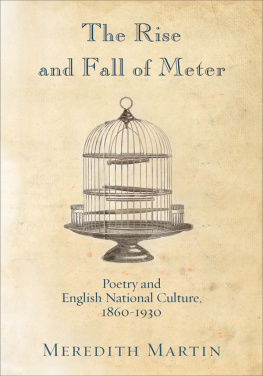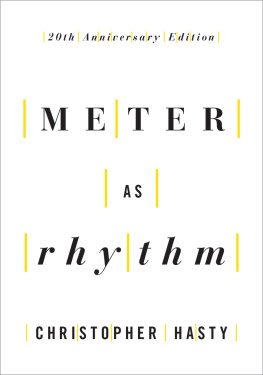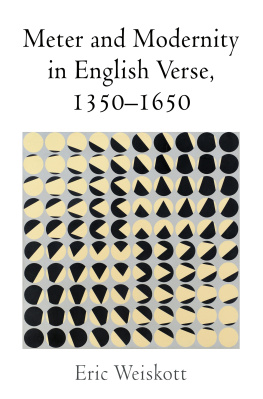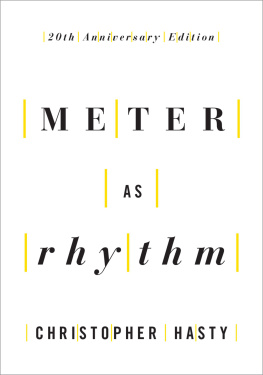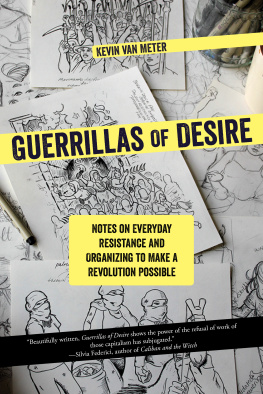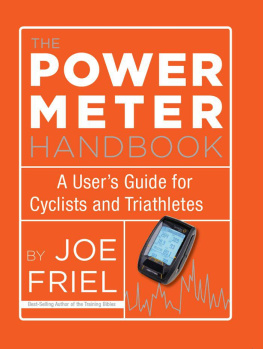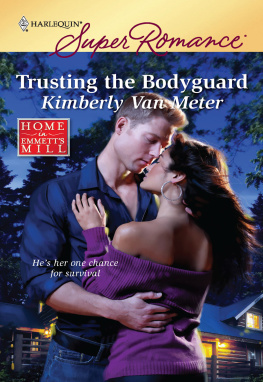THE RISE AND FALL OF METER

The Rise and Fall of Meter
Poetry and English National Culture, 18601930
MEREDITH MARTIN
Princeton University Press
Princeton & Oxford

Copyright 2012 by Princeton University Press
Published by Princeton University Press, 41 William Street,
Princeton, New Jersey 08540
In the United Kingdom: Princeton University Press,
6 Oxford Street, Woodstock, Oxfordshire OX20 1TW
press.princeton.edu
All Rights Reserved
LIBRARY OF CONGRESS CATALOGING-IN-PUBLICATION DATA
Martin, Meredith, 1976
The rise and fall of meter : poetry and English national culture, 1860-1930 / Meredith Martin.1st ed.
p. cm.
Includes bibliographical references and index.
ISBN 978-0-691-15273-8 (hc. : alk. paper) ISBN 978-0-691-15512-8 (pbk. : alk. paper) 1. English poetry19th centuryHistory and criticism. 2. English poetry20th centuryHistory and criticism. 3. English language Versification. 4. National characteristics, English, in literature. 5. Poetics History19th century.
6. PoeticsHistory20th century. I. Title. II. Title: Poetry and English national culture, 18601930.
PR595.V4M37 2012
821.809dc23 2011026832
British Library Cataloging-in-Publication Data is available
This book has been composed in Garamond Premier Pro
Printed on acid-free paper.
Printed in the United States of America
10 9 8 7 6 5 4 3 2 1
FOR MY BROTHER
First of all it is expedient to get rid of the word Poetry.
ROBERT BRIDGES, 1922
CONTENTS


This book is the result of years of conversation, consultation, and collaboration with many friends and scholars. The first and foremost among these is my brother, Robert Martin, whose intellectual investment, editorial acumen, and unconditional love is woven into every word of this project. This book would not have been possible without him, for so many reasons.
The support, kindness, and perspective of Zahid Chaudhary has been both constant and invaluable; I am so thankful to have him as a friend and colleague.
I have been privileged to think about historical poetics with a dream group of scholars over the past five years: Max Cavitch, Michael Cohen, Virginia Jackson, Meredith McGill, Yopie Prins, Eliza Richards, Jason Rudy, and Carolyn Williams. I am in awe of each of you and thank you for your contributions to this project. Many of the arguments and ideas I make here were first rehearsed in our meetings. This book is for all of us.
Yopie Prins deserves special recognition for nurturing this project in its nascent stages, for encouraging my research and writing, for teaching and training me, and for being my constant champion. She has been beside me every step of the way.
I am grateful for the support (over the years and across the globe) of my many dear friends, colleagues, teachers, and students: Gayle Salamon, Jess Roberts, Bonnie Smith, Martin Harries, Tricia McElroy, James McNaughton, Anne Reader, Eric Geile, Martha Carlson Mazur, Amy Young, Graham Smith, Miriam Allersma, Dana Linnane, Lani Kawamoto, Kathleen Brodhag, Janine Konkel, Mary Thiel, Trish York, Mary-Ellen Hoffman-Dono, Tina Fink, Vlad Preoteasa, Vicki Chen, Alex Lester, Matt Hopkins, Margot Wylie, Steve Heard, Peter Miller, Liz Alfred, Allen Grimm, Justin Read, Ania Woloszynska-Read, Ben Conisbee-Baer, Siona Wilson, Eve Sorum, Vivica Williams, Susan and Scott Hyman-Blumenthal, Forrest Perry, Laura Shingleton, Stewart Coleman, Rob Karl, Beth Rabbitt, Evan Johnston, Laura Halperin, Indra Mukhopadhahy, Charles Sabatos, Sylwia Ejmont, Michael Dickman, Peggy Carr, Stan Barrett, Kristen Syrett, Sean Cotter, Meg Cotter-Lynch, Cathy Crane, Alia Ayub, Gary Lloyd, Ben Crick, Jonathan Butt, Bryony Hall, James Hammersly, Lena Hull, Bill Howe, A. B. Huber, Mike Laffan, Charles LaPorte, Jason Hall, Kirstie Blair, Catherine Robson, Anne Jamison, Jim Richardson, John Whittier-Ferguson, Marjorie Levinson, Paulann Petersen, Ken Pallack, Ward Lewis, Karl Kirchwey, Mia Fineman, Joel Smith, Devin Fore, Simon Gikandi, Jeremy Braddock, Caroline Levine, Veronica Alfano, Evan Kindley, Gregory Londe, Amelia Worsley, Jacky Shin, Sara Grossman, Bea Sanford-Russell, Matt Steding, Donald Dietz, Jeff Strabone, Ben Glaser, Matthew Campbell, Simon Jarvis, Herbert Tucker, and Derek Attridge.
I am grateful for my dream research assistant Grant Wythoff, whose work with the Princeton Prosody Archive has helped construct the scaffolding on which this book was built as well as provided the platform for future historically poetic pursuits.
Immeasurable thanks are due to Terry Brogan, whose original archival work made this book possible.
Special thanks to Sarah Cole and Julia Saville for reading early versions of chapters, and to Anne Jamison, Jason Rudy, and Jim Richardson for comments on the final stages. I am grateful to the anonymous readers at Oxford University Press and Princeton University Press for their intelligent and engaging suggestions.
Thank you to my Swiss family: Raphael Vangelista and Gino, Michle, and David Vangelista.
My editors at Princeton University Press, Hanne Winarsky and Christopher Chung, have expertly coaxed this book into its current form. I would also like to acknowledge the encouragement, intelligence, and good humor of Brendan ONeill at Oxford University Press.
I am grateful for all of my supportive, engaging, and helpful colleagues at Princeton University, especially Daphne Brooks, Eduardo Cadava, Anne Cheng, Jeff Dolven, Sophie Gee, Pat Gugliemi, Claudia Johnson, Karen Mink, Deborah Nord, Jeff Nunokawa, Sarah Rivett, Marcia Rosh, Esther Schor, Nancy Shillingford, Nigel Smith, Valerie Smith, Susan Stewart, Benj Widiss, Tamsen Wolff, Susan Wolfson, Michael Wood, and Alexandra Vasquez.
For assistance with archives I am grateful to Helen Gilio, Sue Usher, Jon Stallworthy, Phillip Endean, and the staff of the Harry Ransom Research Center, Bodleian Library, English Faculty Library, Scottish National Library, British Library, Durham University Library, University of Michigan Library, and Princeton University Library.
Parts of chapter 5 were previously published in the article Therapeutic Measures: The Hydra and Wilfred Owen at Craiglockhart War Hospital, in Modernism 14:1 (2007), 3554. The Johns Hopkins University Press. Reprinted with permission of The Johns Hopkins University Press. Thank you also to Indiana University Press for permission to reprint a version of Gerard Manley Hopkins and the Stigma of Meter, from Victorian Studies 50.2 (Winter 2008): 24353. A version of Prosody Wars was first published in the book Meter Matters: Verse Cultures of the Long Nineteenth Century, edited by Jason Hall. Reprinted with the permission of Ohio University Press, Athens, Ohio (www.ohioswallow.com).
I am, as always, strengthened by and grateful for the love and support of my wonderful parents, Robert and Mary Martin.
 THE RISE AND FALL OF METER
THE RISE AND FALL OF METER 
When he walked over the meadows
He was stifled and soothed by his own rhythm.
T. S. Eliot, from The Death of Saint Narcissus,
The Waste Land (facsimile)
It is certain now (thanks in part to Mr. Saintsbury), as it has long been obvious, that the foot is immensely important in English prosody.
Rupert Brooke, reviewing Ezra Pounds
Next page
